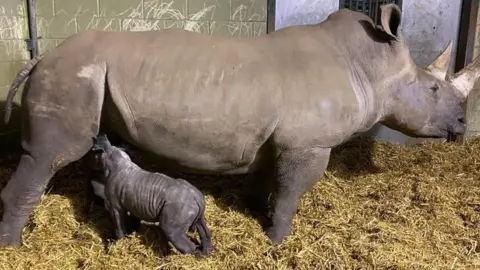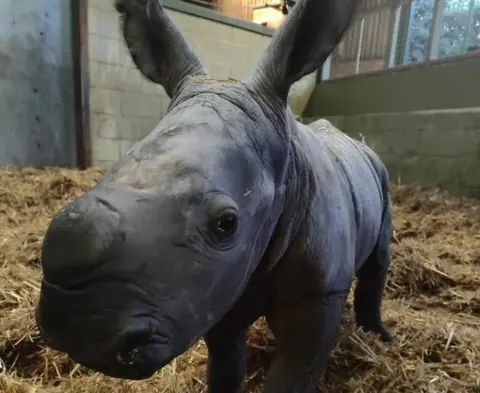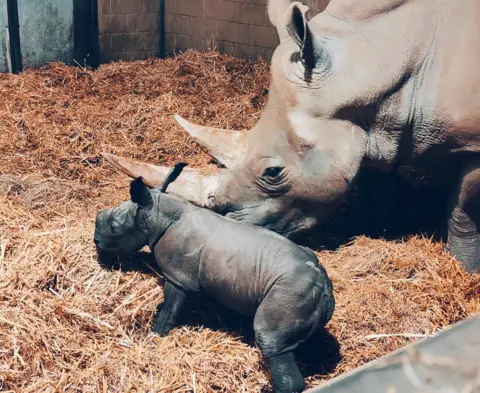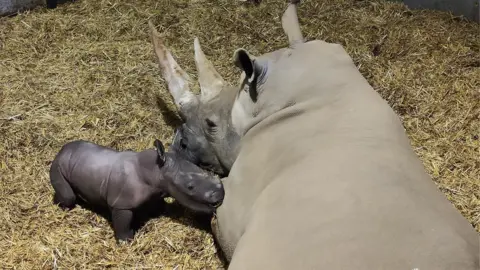Africa Alive: White rhino born at Suffolk zoo for the first time
 PA/Zoological Society of East Anglia
PA/Zoological Society of East AngliaA rare baby white rhino born at a UK zoo has been described as a "little miracle".
The southern white rhino calf was born at Africa Alive at Kessingland, Suffolk, on Saturday.
It was born to mother Njiri, aged nine, and 13-year-old father Zimba, and keepers do not yet know if the currently unnamed calf is male or female.
Africa Alive said it was the first time white rhinos had been bred there.
"So the birth of this calf truly is a little miracle," said Graeme Williamson, the zoo's head of living collections.
 PA/Zoological Society of East Anglia
PA/Zoological Society of East AngliaWhite rhinos typically weigh between 40kg (6st 4lb) and 60kg (9st 6lb) at birth.
The species was previously hunted to near extinction but the success of conservation has seen numbers grow to about 18,000.
They are classed as near-threatened in the wild.
Mr Williamson said: "Njiri and her baby are doing well but she is a first-time mum and we are monitoring her closely.
"Pregnant white rhinos will leave their group shortly before the birth and will stay apart for a few days afterwards.
"To replicate this natural behaviour, we set up a 'birthing suite' for Njiri away from the other rhinos which is monitored closely through CCTV cameras."
 PA/Zoological Society of East Anglia
PA/Zoological Society of East AngliaNjiri and Zimba were identified as being compatible mates by the European Association of Zoos and Aquaria (EAZA) breeding programme, which aims to conserve the population of threatened animals.
The zoo, near Lowestoft, is home to four southern white rhinos - three females and one male.
 PA/Zoological Society of East Anglia
PA/Zoological Society of East AngliaClaudia Roberts, chief executive of the Zoological Society of East Anglia, which runs the zoo, said it was a "very exciting step forward" in the conservation of the species.
The rhino house is currently closed to allow the calf to bond with its mother but will be opened at various intervals over the coming days to allow visitors a first glimpse of the new calf, Africa Alive said.

White rhinos
- They are the second-largest land mammal, after the elephant, and can weigh up to 8,000 lb (570 stone or 3,600kg)
- Their name comes from the Afrikaans word "weit", which means wide and refers to the animal's mouth
- They are also known as the square-lipped rhinoceros, white rhinos have a square upper lip with almost no hair
- The majority (98.8%) of the southern white rhinos are in just four countries: South Africa, Namibia, Zimbabwe and Kenya
- They were thought to be extinct in the late 19th Century, but in 1895 a small population of fewer than 100 individuals was discovered in Kwazulu-Natal in South Africa
- Southern white rhinos are now classified as near-threatened and about 18,000 animals exist in protected areas and private game reserves
- They are the only one of the five rhino species that are not endangered
Source: WWF

Find BBC News: East of England on Facebook, Instagram and Twitter. If you have a story suggestion email [email protected]
